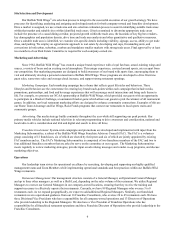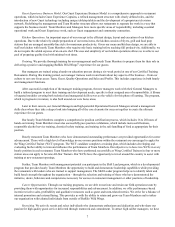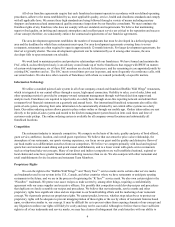Buffalo Wild Wings 2015 Annual Report Download - page 16
Download and view the complete annual report
Please find page 16 of the 2015 Buffalo Wild Wings annual report below. You can navigate through the pages in the report by either clicking on the pages listed below, or by using the keyword search tool below to find specific information within the annual report.16
Our revenues and expenses can be impacted significantly by the location, number, and timing of the opening of new
restaurants and the closing, relocating, and remodeling of existing restaurants. We incur substantial pre-opening expenses each
time we open a new restaurant and incur other expenses when we close, relocate, or remodel existing restaurants. These
expenses are generally higher when we open restaurants in new markets, but the costs of opening, closing, relocating or
remodeling any of our restaurants may be higher than anticipated. An increase in such expenses could have an adverse effect on
our results of operations.
We may be dependent on franchisees and their success.
Currently, approximately 49% of our restaurants are franchised. Franchising royalties and fees represented
approximately 5.4%, 6.1%, and 6.4% of our revenues during fiscal 2015, 2014, and 2013, respectively. Our performance
depends upon (i) our ability to attract and retain qualified franchisees, (ii) the franchisees' ability to timely develop restaurants,
and (iii) the franchisees’ ability to execute our concept and capitalize upon our brand recognition and marketing. Additionally,
the quality of franchised restaurant operations may be diminished if franchisees do not operate restaurants in a manner
consistent with our standards and requirements, or if they do not hire and train qualified managers and other restaurant
personnel. If franchisees do not adequately operate or manage their restaurants, our image and reputation, and the image and
reputation of other franchisees, may suffer materially and system-wide sales could significantly decline.
We could face liability from or as a result of our franchisees.
Various state and federal laws govern our relationship with our franchisees and our potential sale of a franchise. If we
fail to comply with these laws, we could be liable for damages to franchisees and fines or other penalties. A franchisee or
government agency may bring legal action against us based on the franchisee/franchisor relationship. Also, under the franchise
business model, we may face claims and liabilities based on vicarious liability, joint-employer liability, or other theories or
liabilities. All such legal actions not only could result in changes to laws, making it more difficult to appropriately support our
franchisees and, consequently, impacting our performance, but, also, such legal actions could result in expensive litigation with
our franchisees or government agencies that could adversely affect both our profits and our important relations with our
franchisees. In addition, other regulatory or legal developments may result in changes to laws or the franchisor/franchisee
relationship that could negatively impact the franchise business model and, accordingly, our profits.
We may be unable to compete effectively in the restaurant industry.
The restaurant industry is intensely competitive. We believe we compete primarily with regional and local sports bars,
casual dining and fast casual establishments, and to a lesser extent, quick service wing-based take-out concepts and quick
service restaurants. In addition, independent owners of local or regional establishments may enter the wing-based or sports bar
restaurant business without significant barriers to entry and such establishments may provide price competition for our
restaurants. Competition in the casual dining, quick casual and quick service segments of the restaurant industry is expected to
remain intense with respect to price, service, location, concept and the type and quality of food. We also face intense
competition for real estate sites, qualified management personnel, and hourly restaurant staff.
Our success depends substantially on the value of our brands and our reputation for offering guests an unparalleled
guest experience.
We believe we have built a strong reputation for the quality and breadth of our menu items as part of the total experience
that guests enjoy in our restaurants. We believe we must protect and grow the value of our brands to continue to be successful
in the future. Any incident that erodes consumer trust in or affinity for our brands could significantly reduce their value. If
consumers perceive or experience a reduction in food quality, service, or ambiance, or in any way believe we failed to deliver a
consistently positive experience, our brand value could suffer.
Our inability to successfully and sufficiently raise menu prices could result in a decline in profitability.
We utilize menu price increases to help offset cost increases, including increased cost for commodities, minimum wages,
employee benefits, insurance arrangements, construction, utilities, and other key operating costs. If our selection and amount
of menu price increases are not accepted by consumers and reduce guest traffic, or are insufficient to counter increased costs,
our financial results could be harmed.
























